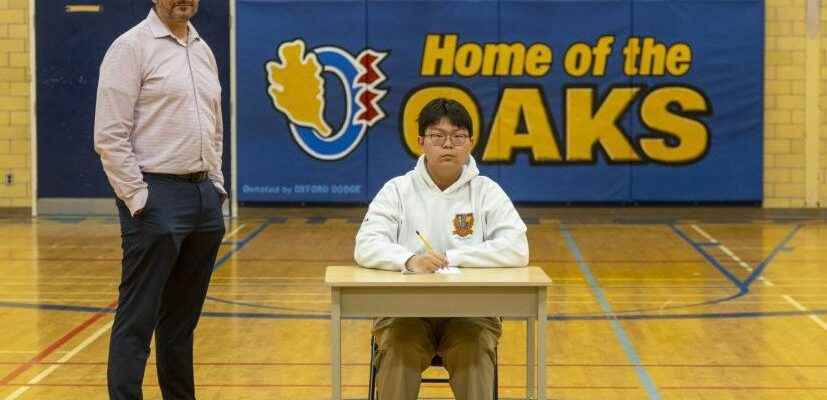When London-area Grade 12 students head to university this fall, all of them will have one thing in common.

When London-area Grade 12 students head to university this fall, all of them will have one thing in common.
Like all his peers in the Thames Valley District school board, Steve Xia, a Grade 12 student at Oakridge secondary school, has not written a single final exam since the pandemic was declared in March of 2020.
“I had one and half years of a very normal high school life,” he said “There were lots of activities, I joined a lot of clubs and met new people.
“It all came crashing when the pandemic started.”
The last two years of learning have been a sometimes frustrating shuffle between online and classroom learning.
Exams were canceled during the pandemic as a way “to maximize instruction time in the classroom to support new learning for students,” said Riley Culhane, Thames Valley District school board associate director.
“We do have a few experiences writing exams in the first one and half years (before the pandemic),” said Xia, who plans to study nursing at Western this fall. ”Our school board has not designated exams, but for some of my classes, our teachers are giving us informal final assessments, not to be counted for marks.”
Still, questions linger about students’ ability to navigate their first year of post-secondary education.
“There is a cloud of unknowns amongst my friends,” Xia said. “But they have hope and confidence that their final semester in high school will give them enough skills to work on, so that they will be able to adapt to university.”
George Letsos, a geography teacher and department head at Oakridge, who is also Xia’s politics teacher, said the pandemic caused a “massive shift in both teaching and learning.”
But he believes there are “much more defining moments” in learning than just an end-of-term exam.

“Just because universities have exams, doesn’t mean that high schools have to have them,” Letsos said. “There’s more ways than just an exam or test, for that matter, to show overall learning.”
As an example, he said his senior class has been working through a United Nations simulation as a way to show off their skills.
“The process of getting them to do research on the specific approach of a country, and communicating that to your peers, and being able to defend that stance, is much more valuable than having an exam,” Letsos said. “By taking on real authentic experiences, we’re trying to revise what teaching and learning looks like.”
Former Thames Valley education director Bill Tucker, who is an associate professor in Western’s faculty of education, said there are ways to get ahead of any lack of experience in their first year of university.
“I would encourage any Grade 12 student who has applied and been accepted to an Ontario university or college program to take advantage of the introductory programs offered over the summertime by post-secondary institutions,” he said. “They provide excellent material to help students acclimatize to the world of university and college.”
At Western University, transition programming includes SmartStart learning and academics, where students can explore differences in university-style learning and catch up on key concepts from Grade 12 courses.
Through its academic success program, a Western student in major first-year courses is paired with an upper-year learning coach who can offer academic support and other opportunities throughout the fall term.
Western also offers Thriving Foundation, a transition program that includes summer academic orientation, where students can access support to create their course schedule.
“We know that it can be challenging for students to transition from high school to university, particularly when considering the unique circumstances presented by the pandemic,” said Stephanie Hayne Beatty, Western’s director of leadership and learning.
Western is hosting an open house on May 7 to give students an opportunity to explore program options, meet members of the university community and learn about supports, she said.
